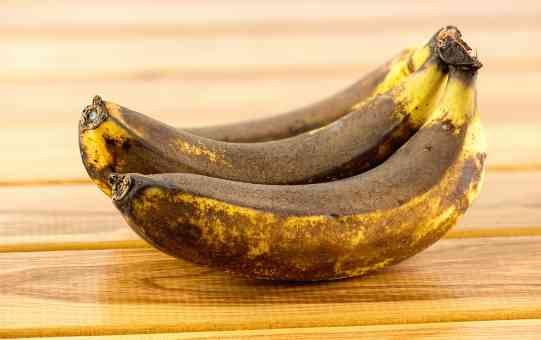Have you ever wondered why do banana peels smell so bad? Have you ever wondered why so many individuals find this odour offensive?
Why do banana peels smell so bad? As bananas ripen, they produce the chemical isoamyl acetate, which gives banana peels a foul odor. The concentration of isoamyl acetate increases as the banana continues to ripen, resulting in a stronger and more pungent odour.
Some individuals find the odour offensive due to the overwhelming natural odour, negative associations with the odour, or simply because they do not find the odour appealing.
Contents
Why do banana peels smell so bad?
Banana peels smell bad due to the presence of the chemical isoamyl acetate, which is produced as the banana ripens. As the banana continues to ripen, the concentration of isoamyl acetate increases, leading to a stronger and more pungent smell.
Some people find the smell of banana peels unpleasantly due to the overpowering nature of the smell, negative associations with the smell, or simply not finding the smell appealing. Genetics and cultural factors can also influence how people perceive the smell of banana peels.
Understanding why banana peels smell bad can help people take steps to reduce the smell if it is unpleasant to them, such as consuming bananas before they become too ripe or wrapping them in plastic or foil before storing them in the refrigerator.
Read Also: Why Do Banana Chips Smell Bad?
What Causes the Smell of Banana Peels?
To understand why banana peels smell so bad, it’s helpful to first understand what causes the smell in the first place. The smell of banana peels is largely caused by a chemical called isoamyl acetate, which is also found in other fruits like pineapples and pears.
This chemical is produced by the breakdown of certain amino acids in the peel, which happens as the banana ripens.

As the banana ripens, the cells in the peel begin to break down and release various compounds. One of these compounds is isoamyl acetate, which has a sweet, fruity smell.
However, as the banana continues to ripen, the concentration of isoamyl acetate increases, and the smell becomes more pungent. This is why ripe banana peels tend to smell stronger than unripe ones.
Why Do Some People Find the Smell Unpleasant?
While the smell of isoamyl acetate might be pleasant to some people, it’s not uncommon for people to find the smell of banana peels to be quite unpleasant. There are a few reasons why this might be the case.
First, the smell of banana peels can be quite overpowering. When the concentration of isoamyl acetate is high, the smell can be quite strong and difficult to ignore. This can be especially unpleasant for people who are sensitive to strong smells.
Second, the smell of banana peels can be associated with certain negative experiences. For example, if you’ve ever accidentally stepped on a banana peel and fallen, you might associate the smell of banana peels with the embarrassment or discomfort of that experience.
Similarly, if you’ve ever had a bad experience with a particularly smelly banana, you might associate the smell with that negative memory.

Finally, it’s also possible that some people simply don’t find the smell of banana peels to be appealing. Just like how some people don’t like the taste of certain foods, some people might not enjoy the smell of banana peels.
The Role of Genetics in Perceiving Smells
Another factor that might influence how people perceive the smell of banana peels is genetics. Research has shown that the ability to detect and perceive certain smells is influenced by our genes. This means that some people might be more sensitive to the smell of banana peels than others, simply because of their genetic makeup.
In addition, certain genes have been identified that are associated with increased sensitivity to certain smells. For example, some people might have a gene that makes them more sensitive to the smell of isoamyl acetate, which could make the smell of banana peels more unpleasant for them.
The Role of Culture in Perceiving Smells
In addition to genetics, cultural factors can also play a role in how people perceive the smell of banana peels. Different cultures have different associations with different smells, and these associations can influence how people perceive those smells.
For example, in some cultures, the smell of banana peels might be seen as a sign of decay or rot, which could make the smell unpleasant.
In other cultures, the smell of banana peels might be associated with positive experiences, such as eating bananas or being in a tropical setting. These positive associations could make the smell more appealing to people in those cultures.
How to Reduce the Smell of Banana Peels?
If you find the smell of banana peels to be unpleasant, there are a few things you can do to reduce the smell. One option is to simply avoid keeping ripe bananas around for too long. As mentioned earlier, the smell of banana peels becomes more pungent as the banana ripens, so if you consume your bananas before they become too ripe, you might not even notice the smell.

Another option is to wrap your bananas in plastic wrap or foil before storing them in the refrigerator. This can help to contain the smell of the banana peels and prevent it from spreading to other foods.
Finally, you can also try rinsing your banana peels before disposing of them. This can help to remove some of the compounds that contribute to the smell, making the peel less noticeable.
Read Also: Why Do Bananas Grow Upwards?
Conclusion:
The smell of banana peels is caused by the chemical isoamyl acetate, which is produced as the banana ripens. The smell can be unpleasant for some people due to a variety of factors, including genetics, cultural associations, and personal preference.
If you find the smell of banana peels to be unpleasant, there are a few steps you can take to reduce the smell, such as consuming your bananas before they become too ripe, wrapping them in plastic or foil, or rinsing the peels before disposal.
FAQs | Banana Peels Smell so Bad
Here are a few mostly asked question why do banana peels smell so bad?
What Causes The Smell Of Banana Peels?
The smell of banana peels is caused by the chemical isoamyl acetate, which is produced as the banana ripens. As the banana continues to ripen, the concentration of isoamyl acetate increases, leading to a stronger and more pungent smell.
why do bananas smell so strong?
Bananas have a strong smell because of compounds like isoamyl acetate and the breakdown of starches into sugars during ripening.
why do bananas smell?
Bananas have a distinct smell primarily due to the presence of various compounds, such as esters and alcohols, in their composition. These compounds contribute to the fruity and sweet aroma that is characteristic of bananas. The ripening process of bananas also plays a role in intensifying their smell as the starches break down into sugars.
do bananas have a smell?
Yes, bananas have a distinct smell. They are known for their sweet and fruity aroma, which is often described as pleasant and recognizable.
why does banana smell bad
Bananas don’t typically have a bad smell. However, if a banana is overripe or spoiled, it can develop a strong and unpleasant odor. This is often due to the breakdown of sugars and the presence of certain compounds, indicating that the banana is no longer suitable for consumption.
